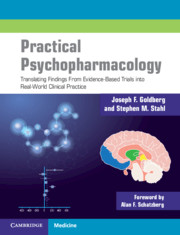 Practical Psychopharmacology
Practical Psychopharmacology from Part I - General Principles
Published online by Cambridge University Press: 19 October 2021
Diagnostic systems such as the DSM have long struggled over whether to organize psychiatric disorders as black-and-white categories defined by operational criteria (where “casehood” is unambiguously either present or absent) versus dimensions of psychopathology (where certain clinical elements are present but insufficient in number or duration to meet minimum criteria that define a particular clinical condition). Clinicians, meanwhile, often tend to identify and treat prominent symptoms, with varying degrees of awareness and concern about their broader context for defining the presence or absence of a distinct syndrome. In this chapter we will examine when pharmacological treatment targets can or should be thought of as unambiguous disease categories as opposed to dimensions of psychopathology that may not always be so clear-cut.
Diagnoses are clusters of signs and symptoms that should form a coherent constellation based on their inter-relationships.
To save this book to your Kindle, first ensure [email protected] is added to your Approved Personal Document E-mail List under your Personal Document Settings on the Manage Your Content and Devices page of your Amazon account. Then enter the ‘name’ part of your Kindle email address below. Find out more about saving to your Kindle.
Note you can select to save to either the @free.kindle.com or @kindle.com variations. ‘@free.kindle.com’ emails are free but can only be saved to your device when it is connected to wi-fi. ‘@kindle.com’ emails can be delivered even when you are not connected to wi-fi, but note that service fees apply.
Find out more about the Kindle Personal Document Service.
To save content items to your account, please confirm that you agree to abide by our usage policies. If this is the first time you use this feature, you will be asked to authorise Cambridge Core to connect with your account. Find out more about saving content to Dropbox.
To save content items to your account, please confirm that you agree to abide by our usage policies. If this is the first time you use this feature, you will be asked to authorise Cambridge Core to connect with your account. Find out more about saving content to Google Drive.